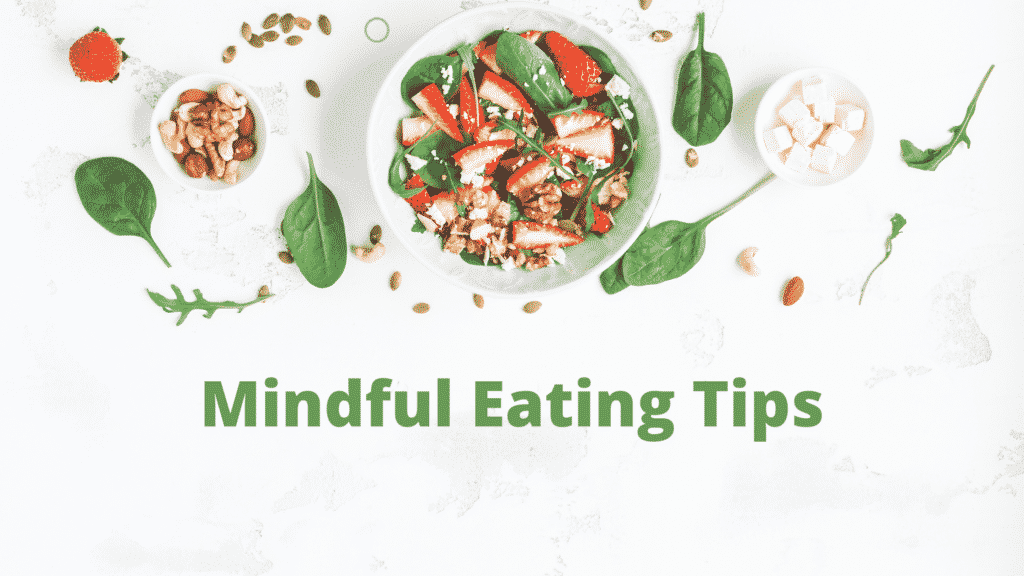Mindful Eating: A Guide to Bringing Awareness to Your Eating Habits
Published on January 28, 2022 – Last Updated on March 31, 2023
What does mindful eating mean to you? Mindful eating, to me, represents a form of eating which is deliberate and reflective. I take the time to really think about my hunger and why I want something to eat mindfully before actually putting any food into my mouth. To be mindful while eating means thinking about what I am doing and what I will be putting into my body.
But, beyond the stereotype, mindfulness is about being aware and present in the moment – which can be applied to many aspects of our lives, including our eating habits if you’re looking for ways to bring more awareness to your relationship with food, check out this guide to mindful eating.
What does it mean to eat mindfully?
When you eat mindfully, you’re paying attention to all aspects of the eating experience, from what you’re eating to how you’re eating it. You’re not just shoveling food into your mouth without thinking about it – instead, you’re taking the time to consider why you’re eating, what you’re eating, and how it’s making you feel.
Mindful eating can help you develop a positive connection with food and can also lead to healthier eating habits. It can help you become more aware of your body’s hunger and satiety signals and can teach you to eat slowly and deliberately. When you eat mindfully, you’re more likely to enjoy your food and to feel satisfied after eating.d
Why is mindful eating important?

Mindful eating can help you develop a relationship with healthy food because it allows you to understand what your body really needs. When you practice mindful eating, you’re focused on the food in front of you and aware of why you want to eat it instead of mindlessly chowing down because the food’s right in front of you or because other people are eating.
Eating mindfully has many benefits, including:
- Lowering your risk of obesity and chronic health conditions
- Setting yourself up for weight loss success
- Decreasing stress related to food choices
- Learning how to manage emotions without food
- Understanding your hunger and satiety cues
- Increasing self-control when eating
If you want to add healthier foods to your daily routine and have a healthier relationship with food in general, try incorporating some elements of mindful eating into your life.
Incorporating mindful eating into your daily routine can help you develop a healthier relationship with food and make more conscious choices about what you eat. One way to do this is by exploring different cuisines, such as Indian cuisine, known for its flavorful and nourishing dishes. By practicing mindfulness while preparing and savoring these dishes, you can enhance your enjoyment of food and become more aware of how it makes you feel. With a focus on fresh, whole ingredients and balanced flavors, simple Indian recipes can be a great addition to your mindful eating journey. So why not try it and bring some mindfulness to your plate?
Another thing to try is weight loss hypnosis which can help you to make healthier food choices and control your portion sizes.
Mindful eater, weight loss, and eating disorders
Eating mindfully can help you make better food selections, maintain good eating practices, and manage your weight. According to research published in the Journal of the Academy of Nutrition and Dietetics, people who eat more mindfully tend to have healthier BMIs than people who don’t practice mindful eating.
This isn’t just because mindful eaters are making more conscious food choices (although they’re probably doing that too) – it’s also because mindful eating helps you become more in tune with your body’s hunger and satiety cues.
When you’re a mindful eater, you tend to pay attention to physical signs of fullness, such as stomach rumbling and a sense of satisfaction, which can help you eat the right amount of food to reach or maintain a healthy weight.
Mindful eating vs. binge eating disorder
If you want to stop binge eating and lose weight in the process, incorporating mindfulness into your weight loss plan can be helpful. Mindful eating can help you become more aware of the emotional triggers that urge you to binge eat, which means that you’re better able to prevent yourself from engaging in unhealthy eating patterns.
Being more aware of your body’s needs through mindful eating can also help you recognize when you’re satisfied with the amount of food, ultimately leading to success in weight loss by focusing on what your body needs and understanding when it’s had enough, you can lose weight without feeling deprived or miserable.
When you eat mindfully, you can learn how to make healthier food choices, become more in tune with your body, and develop a positive connection with food.
If you want to stop the binge eating episodes, you should pay attention to your food cravings. Living in the present moment can really help you change your attitude towards food and have a positive attitude towards eating.
Mindful, healthy eating and unhealthy eating behaviors

Unhealthy eating behaviors can include emotional eating, binge eating, and eating mindlessly. These behaviors can lead to weight gain and other health problems. Eating mindfully is a different way of eating that can help with weight loss and other health goals.
Mindful eating methods have been shown to end emotional eating and external bingeing. Unfortunately, these unhealthy behaviors are common among people who suffer from obesity, so a conscious diet can help you stay on track with your dietary goals!
How to practice mindful eating
There are many ways you can bring more mindfulness to your eating routines. For example, you could try doing things like eating alone or disconnecting from distractions like the TV, using chopsticks, and chewing your food more before swallowing it. Or you could experiment with different meditation techniques designed specifically for eating, like the MindTastik guided meditation approach. Practicing guided meditations will improve your overall health and could help you have a mindful life.
No matter which route you take, remember to be patient with yourself. If you fall off the bandwagon and end up stuffing your face with chocolate cake in front of the TV, that’s okay – mindfulness is about learning and improving gradually over time. The important thing is to develop a more mindful connection to food constantly.
Here are some helpful tips for mindful eating:
- Eating slowly and not rushing the meals can help you feel fuller and enjoy your food more. Instead, savor every bite by taking a small break between bites to check if you’re still hungry.
- Use mindful breathing to help you slow down at mealtimes and focus on your food instead of other distractions.
- Try eating with chopsticks or by hand to get in the habit of taking smaller bites and chewing thoroughly.
- Chew thoroughly.
- Focus on the sensation of eating and be fully aware of the foremost bite. Use all your senses while taking small bites.
- Eat in a quiet place or remove distractions from mealtime.
- Turn off the TV and any other electronic devices. Don’t read, work, or talk while eating, either.
- Be aware of your body’s signals to know when to stop eating and check in with yourself before you take another serving at each meal. Be mindful if you’re still hungry or if you’re starting to feel complete.
- Acknowledge your thoughts and emotions surrounding eating and identify situations where you tend to overeat or eat unhealthy foods.
- Identify your food cravings and be mindful when indulging in them. When you feel the urge to binge, try asking yourself: why am I craving this food? What do I think will happen if I eat this food? What emotions am I feeling right now that is causing me to crave this meal?
Other tips for conscious eating

Healthy foods have a distinct taste, color, smell, and texture. When you eat mindfully, you can become more aware of how your body is affected by these qualities of food.
Express gratitude: Before taking your first bite, thank the food for nourishing and energizing your body. Then send those same thoughts to all the people involved in providing the food.
Notice how you feel after certain foods: Pay attention to how different types of foods affect your mood and energy levels and any physical changes like an increase or decrease in appetite.
Notice how you feel before and after eating: Mindful eaters often notice that they are not as hungry as they thought. Or, they don’t need to eat so much because they eat mindfully. How do you feel at the end of your meal? How do you feel an hour afterward? Do any emotions come up during or after eating? Food may taste good, but what does it do for you?
Notice the colors of your food: Mindful eating often includes eating slowly and really looking at the food. Notice the reds, greens, oranges, and yellows. Colors can give you clues about nutrients in your favorite foods. For example, carrots are orange because they contain beta-carotene, which your body converts to vitamin A.
Notice textures: How does the food feel in your mouth? How do different foods or flavors change as you chew them?
Connect with others: Share your mindful eating experience with friends and family. Have conversations about how certain foods make you feel. Ask questions like “How is this food affecting my body?” or “What does a piece of fruit mean to you?”
Conclusion
While mindful eating is often associated with weight loss or those struggling with an eating disorder, the practice can benefit anyone looking to develop more awareness of their eating habits. Practicing mindful eating takes time and patience, but the results can be worth it. Have you tried mindfulness when it comes to your diet? Let us know about your experience in the comments below.







